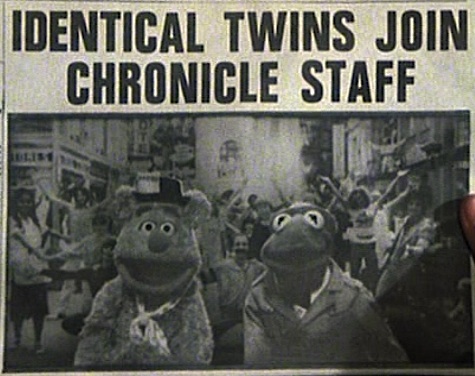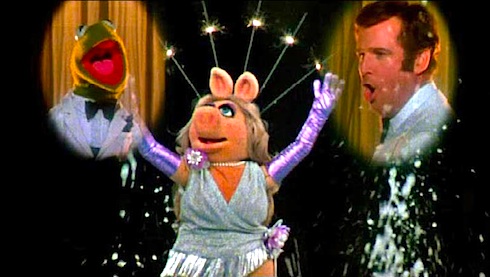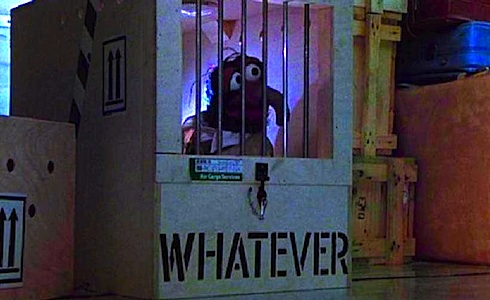Let me tell you a little secret that you know already but just forgot: The Great Muppet Caper is the best Muppet movie.
I could stop there and be happy that time and history will reveal this assertion as the ultimate truth—I mean, I’m not getting paid by the word count here—except that would rob you of enlightenment and rob me of something to link to when I repeat this in all caps in my OKCupid profile.
The Muppet Movie is fondly remembered, and rightfully so, but its successor The Great Muppet Caper is the superior effort. Watching it, it’s as if the movie is the result of all the good ideas Henson and company had while making their first film. The jokes are sharper and more relaxed, the songs just as peppy and memorable, and the Muppet performers far more comfortable with a big screen outing. In short, The Great Muppet Caper is The Muppets perfected.
There’s not much mystery to the titular caper in this film. Fozzie and Kermit play merrily incompetent investigative reporters, with Gonzo along as their photographer. While they’re photographing chickens (or themselves), fashion mogul Lady Holiday’s jewels are being stolen in a daring daylight robbery right behind them. And all of this during the movie’s opening number! An opening number that somehow manages to utterly destroy the New York City street that it takes place on.

Right out of the gate, The Great Muppet Caper can barely contain itself, and plot never pretends at subtlety. When Charles Grodin shows up as Lady Holiday’s worthless brother, it’s obvious that he’s the jewel thief without him having to utter a word. (Also it’s Charles Grodin. My entire generation knows him as the asshole dad from Beethoven. Of course he’s the bad guy. HE HATES PUPPIES.) Getting the plot out of the way allows the movie to showcase its most consistent strength: the interaction between the Muppets and the real world.
A lot of the movie’s comedy stems from the personalities of Kermit, Miss Piggy, Fozzie, et al and their interactions with the world through a myriad of seemingly normal situations. Kermit, Gonzo, and Fozzie getting off a plane involves crates, a stereotypical Englishman, and a sneaking focus on Gonzo’s genealogy. (Pictured at the top of the post.) Miss Piggy’s job interview as Lady Holiday’s secretary turns into a revelation of Piggy’s personal aspirations and very obvious mental and physical limits. Kermit and Piggy’s courtship is tested by a whole host of things, Piggy’s massive sense of self-esteem, John Cleese and the wife he never lets out of the house, and most importantly, the predatory attraction of Mr. Charles Grodin.

Describing humor is a frustrating task. It’s subjective. If you get it, you immediately get it. If you don’t, it can’t be explained to you. I would love to quote this movie until time comes to an end, but that won’t adequately explain the delight inherent in The Great Muppet Caper. It still tickles me silly when Fozzie orders champagne, then comments to the table next to him that “if you put enough sugar in it, it tastes just like ginger ale.” Similarly, the headline to the Chronicle (pictured above) is a half-second joke, but it makes me roar just to think of a world where two adorable but incompetent reporters have that kind of pull. There are a million tiny jokes, all dependent on the personality of the Muppet performers, so the humor ends up creating an intimacy between you and the Muppets. There’s at least one joke in the film that you will laugh at that no one else will seem to get. That is your joke. The Muppets wrote it for
(Here is mine:)
The movie would be good enough like that, but the broad strokes are just as entertaining. Every human actor here borders on the cartoonish, but without overlap and without overstaying their presence. Miss Piggy has at least two elaborate musical numbers that boggle the imagination, and at least one where she imagines Charles Grodin and Kermit dueling over her with heartfelt arias as harps are played underwater. (And even here, a subtle joke is snuck in regarding Grodin’s clearly overdubbed singing voice.)
(Skip to 3:20 for dueling Kermit/Grodin.)
Perhaps best of all, The Great Muppet Caper captures Jim Henson and the Muppet performers having good-spirited fun in a manner similar to The Muppet Show during its finest moments and in a way that the other Muppet movies don’t fully grasp. Coming so soon after The Muppet Movie and lacking any memorable songs about rainbows, this film is often overlooked. But once you watch it, that just seems weird. Because this? This is The Muppets at their purest.
Chris Lough is the production manager of Tor.com and went into production at about the same time as this movie did, which might explain his helpless love of it.











Piggy has “obvious mental and physical limits”? Hoo boy. You love to live dangerously, I guess …
gonzo journalism at it’s best. Sorry someone had to say it
I completely agree. I have always loved this movie. I’ve seen it so many times that many of the lines are burned into my brain.
The Great Mupper Caper is the best of all muppet movies!! My all time favorite, especially the motorcycle chase scene.
Caper has some of the best moments, but overall I find it too drawn out and tedious to be the best.
I’m going to express what I suspect will be a very unpopular opinion — Muppets from Space is the best Muppet movie.
@5. Oh Nick, just wait until next Tuesday. I have a LOT to say about Muppets From Space….
Loved this movie- Gonzo hailing a cab in NY– classic!
Good times:)
Woof™.
fantasy , miss piggy
extasy, miss piggy
miss piggy it’s you!
@Nick Marino & Tor Chris, I am not sure I’d agree with the assessment that Muppets from Space was the best but it does have Miss Piggy getting ready for work to the music of Brick House by the Commodores; absolutely priceless.
Also, I loved this one when it came out when I was a boy. One of Henson’s best. Always a great sign of a child’s movie if there are bits for the adults to enjoy as well.
Kato
One of my favorite of all Muppet bits is in here… (from memory)
Gonzo: Have you ever thought about what it would be like to just step out of the balloon?
Kermit: What, plummeting?
Gonzo, dreamily: Yeah…
Layers of humor.
My personal joke is “GOOD IDEA, HERE’S THE PAPER TOWELLS.”
So many great bits in this. “Theives aren’t breathing down your neck!” always cracks me up, as do Miss Piggy’s modeling photos. “Demure!” I love that all her expressions are the same – a fun spoof both of fashion models, and, well, PUPPETS.
And how can we forget Janice’s throw-away line about walking around naked? Such a hippie chick.
Ignoring the new movies, of the original three this movie is easily the worst. I don’t see how you could possibly come to any other conclusion. Camp can only take you so far. This movie gets really tedious in parts.
And as I explained before, it’s not just songs about rainbows, it’s all the songs. The weakest song in the Muppet Movie is still as good as the best song in this one.
And all the things you felt worked better in this movie, are reasons why Muppets take Manhatten is clearly the best of the three, not Caper. What could you be thinking?
Chris, as you were talking about the joke that’s “yours”, I thought of Sam Eagle. Then I saw your clip. You can’t have that joke. It’s mine. I quote it frequently. Ok, fine. I’ll share it with you.
But if I have to choose another joke, I’ll go with the line that’s stuck with me since I saw this when I was a kid:
“I don’t have no other pants!”
Dear Radynski,
With all due respect, how many times have you had large objects fall at maximum velocity onto your head?
WORST of the three!? Inconceivable! Let us set a date to duel this one out.
In the meantime, let me offer my own evidence: John Cleese. “You were only lip-synching!” “What color are their hands now?” Traveling via crate. The entire cast sky-diving. Dianna Rigg. Jim Henson cameo! Oscar the Grouch!
Definitely my favorite.